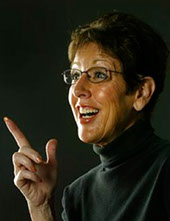< back to News list
The Beehive Interview: Janice Noga
 (February 10, 2011) If you want a story of pure pluck, don’t look any farther than Janice Noga. This musical-theater performer, who had a career stint in New York, had to have brain surgery a number of years ago. The surgery impacted her speech. Determined to sing again, however, she practiced up a storm. One of her favorite audiences consisted of the community at United Cerebral Palsy of Central California, an organization which Noga has grown close to over the years.
(February 10, 2011) If you want a story of pure pluck, don’t look any farther than Janice Noga. This musical-theater performer, who had a career stint in New York, had to have brain surgery a number of years ago. The surgery impacted her speech. Determined to sing again, however, she practiced up a storm. One of her favorite audiences consisted of the community at United Cerebral Palsy of Central California, an organization which Noga has grown close to over the years.
For Valentine’s Day weekend, Noga is presenting a benefit concert 7:30 p.m. Saturday titled “For Her Sweethearts” at the Warnors Theatre. Proceeds will go to UCP. Here’s my Beehive interview:
Question: Tell us about the impact of your brain surgery.
Answer: I was barely able to speak simple words. Abstract words were especially difficult. ex: “No if’s and’s or but’s” was impossible to say. I also lost all the lyrics I had sung my entire life. I especially lost the power of imagery and focus that helped me remember the lyrics. I went through a period of speech therapy to regain my speaking voice and the ability to speak in complete sentences. When the speech therapy ran out I took a class in advanced acting from Brad Myers at Fresno State. It was a Shakespeare class.
I had to memorize long scenes from two Shakespeare plays and one Ibsen play. Brad didn’t tell the class about my surgery. I wasn’t treated differently. He challenged me and just jumped in. The discipline of memorizing the scenes and performing in front of the class helped in my come back. I’ve never been able to get back to 100% but I won’t allow it to stop me from doing what I love.
Tell us about Saturday’s concert. What’s your concept for the show? What are some of the songs on the program?
To give back to my UCP sweethearts with songs that will reflect the many kinds of love during the season of love, Valentine’s Day… love songs and done me wrong songs in an elegant venue. I’ll be singing: Embraceable You, When I Fall in Love, Can’t Help Lovin That Man of Mine, What Do You Get When You Fall in Love, Sometimes When We Touch and Memory to name a few.
For those who aren’t familiar with your background, give us a recap of your professional career.
I have performed in nightclubs in New York, New Orleans, Los Angeles, Mexico City and London. I was also an understudy in Zorba earlier in my career. I’ve performed for Hal Prince and Richard Rogers and Martin Charnin. I was the first leading lady at Roger Rocka’s dinner theatre as “Momma Rose” in Gypsy and repeated the role five years later. I was an original member of Good Company Players Caberet Act. I was the founding partner with Jeanette Bryon of Valley Women’s Theater based in Fresno and had leading roles as a member of the Fourth Wall in Visalia. I’ve sung the national anthem for the past 16 years for the opening session of the California Senior Legislature in the Assembly Chamber in the Capitol. I also have the distinction of singing in the Oval Office in the White House. For the past 8 years I have toured a one woman show named JANKA for 90 performances around the country, London and Edinburgh.
How did you come to be involved with United Cerebral Palsy of Central California?
A dear friend, Vonnie Sturgeon, invited the GCP Caberet to perform at the telethons every year. I also hosted a special event for UCP and I was invited to join the Board of UCP of Central California. This was in 1982. I’ve been a board member for 29 years.
You sang many times in front of adults at the UCP center as you worked to recovered your vocal abilities. Tell us about that experience.
Every year I sang on the UCP telethon. The year I had brain surgery the executive director Jeff Snyder of UCP encouraged me to sing for the telethon. I practiced and practiced but I needed an audience. So, every week I would bring my music to the center and rehearse for the adults at the center trying to complete one song. As I progressed my UCP audience became my critics. When I would lose focus and make a mistake they would tell me to “focus, focus.” “We know you can do it.” Their kindness and patience over many weeks helped me find my confidence once again. They will always be my “sweethearts.”
You say those audiences were “tough” but your favorite. Why is that?
Because they understood how frustrating a disability can be, they were in a unique position to encourage me and not allow me to give up. Their being tough made me know that they were pulling for me. They wanted me to succeed. If I succeed they succeed.
Twitter: @DonaldBeeArts
Mail: dmunro@fresnobee.com